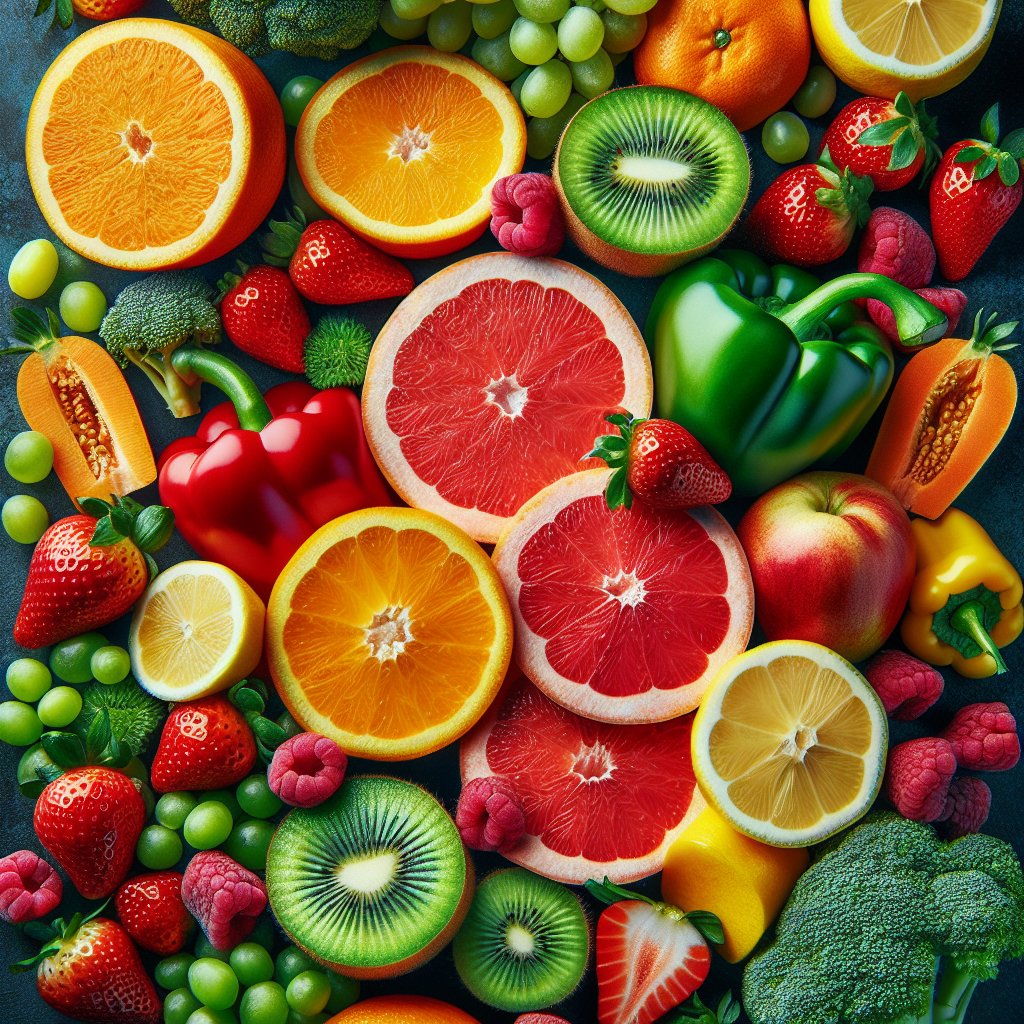Does Vitamin C Make You Poop? Unveiling the Surprising Truth About Vitamin C and Digestion!
Brief Explanation of the Importance of Vitamin C
Hey there, lovely readers! Today, we’re delving into the fascinating world of Vitamin C and its surprising connection to digestion. You may have heard murmurs about Vitamin C and its potential impact on your bathroom routine, but there’s so much more to explore.
Vitamin C, also known as ascorbic acid, is an essential nutrient that plays a crucial role in maintaining overall health. This powerful vitamin is renowned for its immune-boosting properties, but its benefits extend far beyond that. It acts as an antioxidant, supports collagen production, aids in the absorption of iron, and plays a vital role in maintaining healthy skin.
Vitamin C’s Role in Digestion
When it comes to digestion, Vitamin C contributes to the health of the gastrointestinal tract and helps in the absorption of essential nutrients. It supports the integrity of the mucosal lining in the digestive system, guarding it against infections and inflammation. Additionally, Vitamin C enhances the absorption of non-heme iron, which is the type of iron found in plant-based foods, supporting overall digestive health.
Stay with us as we uncover more about this super-vitamin!

How Vitamin C Affects Digestion
Hey there, keto enthusiasts! Let’s dive into the fascinating world of vitamin C and its impact on our digestion. So, does vitamin C make you poop? Let’s find out!
Vitamin C is a vital nutrient with a plethora of benefits, one of which is its positive effect on digestion and bowel movements. Research has shown that vitamin C can promote good digestive health by preventing constipation and supporting regular bowel movements.
When it comes to digestion, vitamin C plays a crucial role in the formation of collagen, a protein that helps maintain the health of the digestive tract. A healthy digestive tract ensures that food is properly broken down and absorbed, which is essential for overall digestive wellness.
Additionally, vitamin C acts as a natural laxative by drawing water into the intestines, softening the stool and making it easier to pass. This can help alleviate constipation and promote regularity, leading to a happy and healthy digestive system.
So, to answer the burning question – yes, vitamin C can indeed make you poop, but in the best way possible! By supporting healthy digestion and bowel movements, this vital nutrient can keep your gut in great shape while you enjoy all the benefits of the ketogenic lifestyle.
In the next section, we’ll explore the ideal sources of vitamin C for your keto journey. So, stay tuned!
Research Studies on Vitamin C and Bowel Movements
Several research studies have delved into the relationship between Vitamin C intake and bowel movements. A study published in the Annals of Internal Medicine found that high doses of Vitamin C, specifically from supplements, were associated with an increased frequency of bowel movements.
Another study in the European Journal of Clinical Nutrition revealed that Vitamin C supplementation led to a significant decrease in the time it takes for food to travel through the digestive system, thereby potentially alleviating constipation.
Moreover, a comprehensive analysis in the World Journal of Gastroenterology pointed out that adequate Vitamin C intake was linked to a reduced risk of developing gastrointestinal disorders, including constipation.
It is important to note that while these studies demonstrate a correlation between Vitamin C intake and bowel movements, the effects can vary based on individual factors such as overall diet, lifestyle, and pre-existing digestive conditions.
Based on these findings, it’s evident that Vitamin C does play a role in digestive health. The relationship between Vitamin C and bowel movements underscores the importance of maintaining adequate levels of this essential nutrient for overall gut health and regularity.
Next, let’s explore the impact of Vitamin C on gut microbiota and how it influences digestion.
Recommended Daily Intake of Vitamin C
When it comes to maintaining overall health, including digestive health, getting enough Vitamin C is essential. This powerful antioxidant supports the body in numerous ways, from boosting the immune system to promoting healthy skin and assisting with iron absorption. But how much Vitamin C do you need to keep things running smoothly?
According to the National Institutes of Health, the recommended daily intake of Vitamin C for adult women is 75 mg. However, during pregnancy and lactation, the requirements increase to 85 mg and 120 mg, respectively. For individuals who smoke or are exposed to secondhand smoke, it’s advised to aim for an additional 35 mg per day due to the increased oxidative stress caused by smoking.
When it comes to digestive health, Vitamin C plays a crucial role. It not only helps in the repair and growth of tissues in all parts of your body but also aids in the proper functioning of the digestive system. Research suggests that Vitamin C may help protect the stomach lining and prevent digestive issues such as gastritis and peptic ulcers.
Moreover, Vitamin C can help alleviate the symptoms of constipation. It acts as an osmotic agent, pulling water into the intestines, which helps soften the stool and support regular bowel movements. This can be particularly beneficial for individuals struggling with occasional constipation.
So, ensuring that you meet the recommended daily intake of Vitamin C not only supports your overall health but also contributes to a happy and healthy digestive system.
List of Natural Sources of Vitamin C
Vitamin C is a vital nutrient that our bodies need for overall health, especially because it is water-soluble and cannot be stored in the body. As a result, it’s important to regularly incorporate Vitamin C into our diets. The good news is that there are numerous natural sources of this essential vitamin, making it easier than ever to ensure you’re getting enough.
Citrus Fruits
Citrus fruits like oranges, lemons, and grapefruits are renowned for their high Vitamin C content. Not only are they delicious and refreshing, but they are also versatile ingredients in both sweet and savory dishes.
Berries
Strawberries, blueberries, raspberries, and blackberries are all excellent sources of Vitamin C. Whether enjoyed on their own as a snack, mixed into a smoothie, or added to yogurt, these little fruits provide a big dose of goodness.
Kiwi
Kiwi is a small fruit packed with a powerful punch of Vitamin C. Its unique flavor and vibrant green color make it a fun addition to fruit salads or even as a garnish for desserts.
Bell Peppers
Colorful bell peppers, especially the red ones, contain high levels of Vitamin C. They can be enjoyed raw with dips or cooked into a variety of dishes, adding both flavor and nutrition.
By incorporating these natural Vitamin C sources into your daily diet, you can ensure that your body receives the necessary nutrients for optimal health and well-being, without having to rely solely on supplements.

Potential Side Effects of Excessive Vitamin C Consumption
So, we all know that Vitamin C is essential for a healthy immune system and overall well-being. But can too much of a good thing actually have negative effects? Let’s dive into the potential side effects of excessive Vitamin C consumption and its impact on bowel movements.
While Vitamin C is generally considered safe, consuming it in excess amounts may lead to some unwelcome side effects. One of the most commonly reported effects of excessive Vitamin C intake is gastrointestinal upset. This can manifest as stomach cramps, nausea, or diarrhea.
The impact of Vitamin C on bowel movements is particularly interesting. Excessive Vitamin C intake can indeed lead to looser stools or even diarrhea in some individuals. This is because Vitamin C is a water-soluble vitamin, and when taken in large amounts, it can draw water into the colon, softening the stool and potentially increasing the frequency of bowel movements.
It’s important to note that the threshold for excessive Vitamin C consumption varies from person to person. While the recommended daily intake for Vitamin C is 75mg for women, consuming over 2000mg per day can lead to adverse effects, including digestive discomfort.
In the next section, we’ll explore the potential benefits of Vitamin C for digestion and overall health.
Tips for Managing Vitamin C Intake
Getting the right amount of vitamin C is crucial for overall health, including gut health. Here are some practical tips on how to manage and balance your vitamin C intake to promote healthy digestion without adverse effects:
Choose Whole Foods
When it comes to getting your daily dose of vitamin C, opt for whole foods such as oranges, strawberries, kiwi, and bell peppers. Whole foods not only provide vitamin C but also come with fiber, which aids in digestion and can help mitigate any potential adverse effects on the stomach.
Avoid Excessive Supplementation
While vitamin C supplements can be beneficial, excessive intake can lead to digestive issues such as diarrhea. It’s best to obtain the majority of your vitamin C from natural food sources and use supplements sparingly, if at all.
Spread Out Your Intake
Instead of consuming a large amount of vitamin C in one sitting, spread your intake throughout the day. This approach can help prevent overwhelming your digestive system and minimize the likelihood of experiencing digestive discomfort.
Stay Hydrated
Proper hydration is essential for effective digestion. When increasing your vitamin C intake, be sure to drink an adequate amount of water to support your digestive processes and prevent any potential constipating effects.
By following these tips, you can effectively manage your vitamin C intake to support healthy digestion without experiencing adverse effects.
Conclusion
After diving into the surprising relationship between Vitamin C and digestion, it’s clear that maintaining a balanced approach to Vitamin C consumption is crucial for overall digestive health. While some studies suggest that large doses of Vitamin C may have a mild laxative effect, it’s important to remember that individual responses can vary. Consuming Vitamin C-rich foods in moderation, alongside a well-rounded diet and healthy lifestyle, is key to reaping the benefits of this essential nutrient without experiencing any unwanted digestive discomfort.
It’s also worth noting that Vitamin C offers a myriad of other health benefits, including its powerful antioxidant properties and its role in supporting the immune system. So, instead of fixating solely on its potential impact on bowel movements, let’s embrace Vitamin C as an integral part of a holistic approach to wellness.
Ultimately, maintaining a balanced and varied diet that includes a spectrum of nutrients, including Vitamin C, is the cornerstone of digestive health. Remember, it’s all about balance and moderation!


